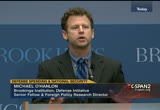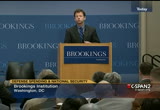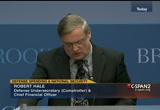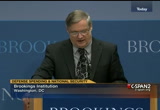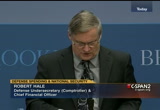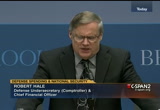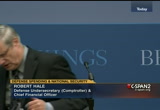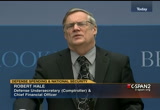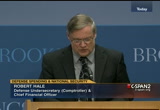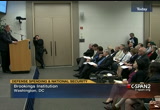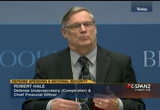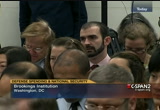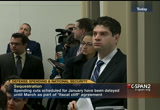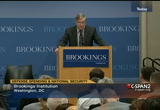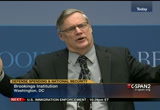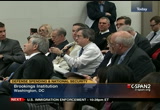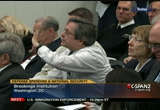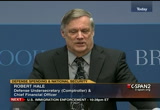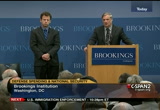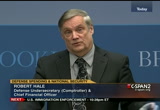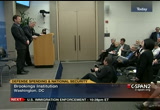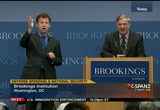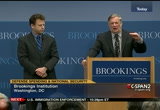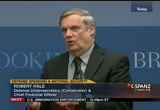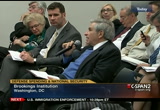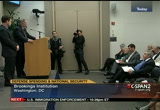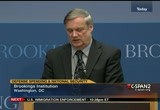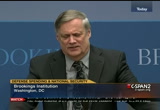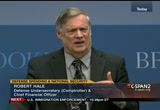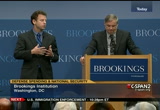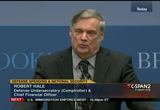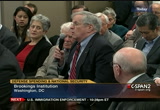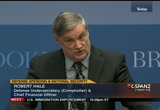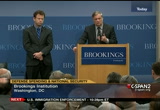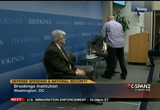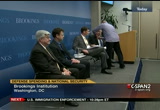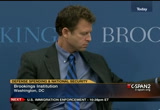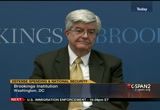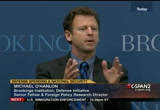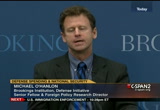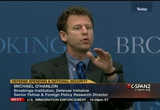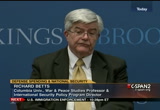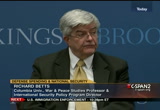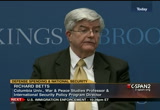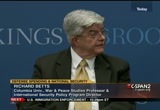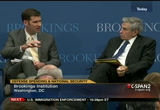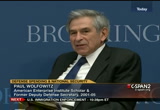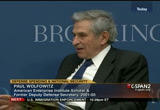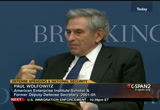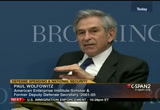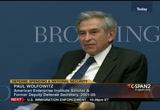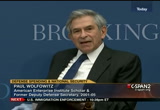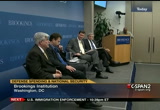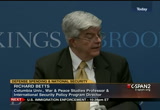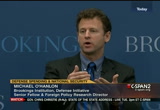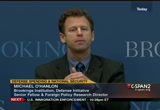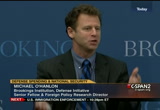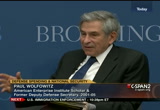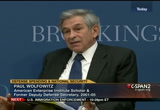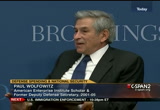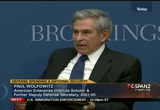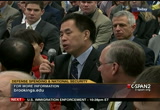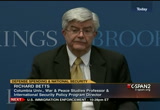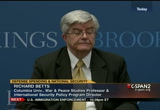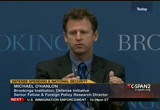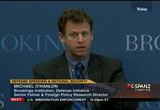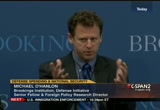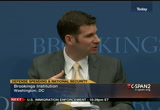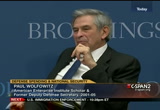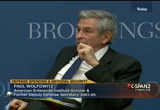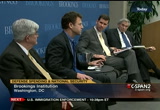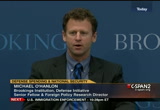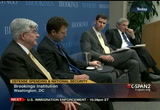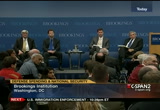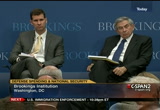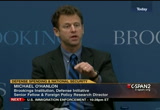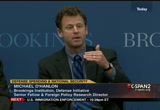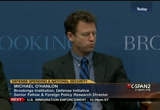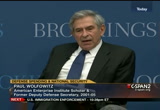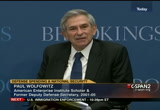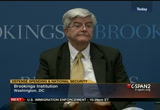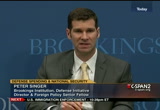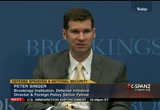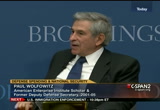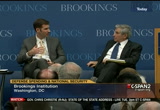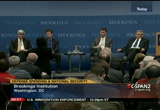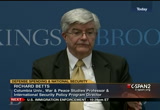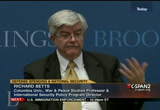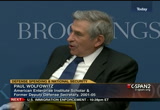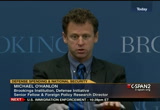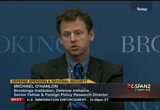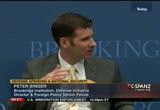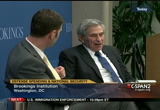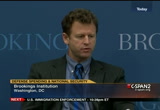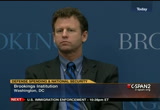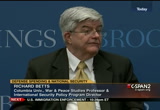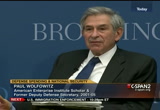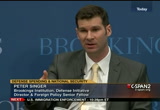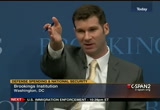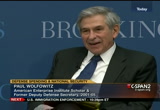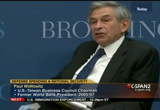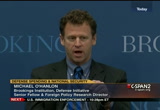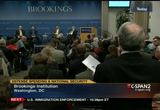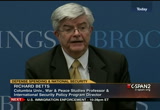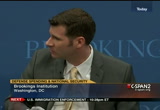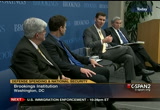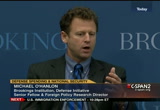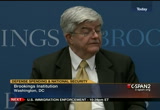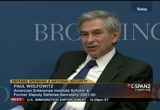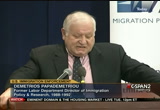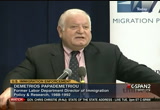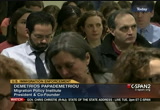tv Tonight From Washington CSPAN January 7, 2013 8:30pm-11:00pm EST
8:30 pm
working with him 20 years ago at the budget office. fantastic career as noted, the comptroller of the pentagon today. one of the top officials, the key advisors to the secretary of defense on all matters financial trying to figure out how to save money and execute efficiencies and deficiencies. we were building a post-cold war military as well as people on both sides of the aisle. bob was the comptroller of the air force during the administration and has also been
8:31 pm
the executive director of the american society of comptrollers. without further ado, please join me in welcoming one of my favorites, robert hale. [applause] >> good morning. how is everyone doing? listen, i am glad to be here. for a number of reasons. one of them is that comptrollers do not get invited out that much. i have a number of stories. bad news is you have a serious problem and if you don't have an immediate transplant, you're going to die. but the good news is i have three donors, you can choose any one of them. one of them is a former olympic athlete and prior to her demise, she was practicing every day for the olympics. another one was a former triathlon athlete and he was swimming and running everyday. the third one is an 80-year-old
8:32 pm
comptroller. which one would you like? and he thought for a moment and said i will take the comptroller. they prepared for the surgery and should the man's wife said why would you she was a heart transplant donor of an 80-year-old? and he said, his heart has never been used. [laughter] [laughter] so how do we maintain national security? especially in leaner budget times. the defense budget -- but we have seen some real declines and there may be more coming. so what do we need to do to accommodate leaner times? well, i will offer three starts as a strategy as to how we go about maintaining national security that is the person more
8:33 pm
important thing. the second thing is we have to make more disciplined use of the money that we get. we have to stretch our defense dollars and i will tell you what we're trying to do. third, we need desperately need more stability in terms of budget size and budget process. and i will say two words at the end about sequestration and other things that fall into that category. starting with the strategy, it is a key to success at all times that may be particularly when you are facing leaner budget times. the old saying about knowing where you're going. without a strategy, we would not know where we're going. you might say that's obvious, but in some past drawdowns, there has been an avoidance of nature to them. there are some across-the-board aspects to it. it is important in your go in january 2012, president obama
8:34 pm
announced a new defense strategy. we believe it is the right one for the times. interestingly, despite a lot of criticism for all the specifics are we proposing connection to that strategy, most members of congress deemed to have accepted this strategy. it is meant to help us confront a period of time that we face in complex security challenges. syria and arab spring, iran and its relations with the whole world to include israel, north korea and so many more. so what are the elements of this strategy? i won't spend a lot of time, but briefly it assumes we will be smaller, have leaner forces, but they will be highly ready forces. one of the ways they will be leaner is we will no longer write their forces for long stability operations like we did in iraq. but we will look for ways for reversibility because we understand and often guess wrong about future threats. we feel that we must be highly
8:35 pm
ready because there is a much of a note on the category of threat to national security. the second major item in that strategy is to rebalance our forces for the pacific in the and the middle east. we are working towards rebalancing asia pacific, maintaining the present era, moving around from forces and it is more on guam. a rotational presence in australia. warships in singapore and possibly a presence in the philippines. we will pay attention to long-term threats, including china. we will maintain technological superiority. the third element of this strategy and invest more of some high-priority types of activities, but we recognize
8:36 pm
that we are going to have to meet budget constraints. we have made some proposals from fiscal cliff 12 fiscal fiscal cliff 17. we work to increase things like fiber investments and another number of other decisions involving that strategy. we believe that the current level of defense spending is roughly consistent with that strategy. so we hope congress will continue to support that level or something close to it. strategy isn't enough in lean budget times. strategy is not enough but we
8:37 pm
owe it to the taxpayers to stretch the defense dollars wherever they can. it is often referred to as efficiencies. i do not like the term because what we are doing is an economist to define them. more often what we are doing is eliminating lower priority programs where we think that makes sense in order to hold down spending. so what have we done to make more disciplined use of the sources? two major packages in the last two budgets. many have had some cuts before that as well. it includes weapons program and future combat system in a more focused combat vehicle. in favor of buying more of the
8:38 pm
ahf, and we have had production in the f-22 aircraft and another of their initiatives. some of the others focused on organization and business process changes. we established a combatant command and we had repeated sourcing across the board grouping our lives to try to use our marketplace and we look at things like consolidating e-mail and reducing contact with weekend. and some activities that qualify by programming and trying to help pilots cut fuel costs. we are all trying to do on a bigger scale. another set of initiatives is aimed at slowing the growth,
8:39 pm
which has increased in b's form until military retirees. we have gotten congress to agree with increases in pharmacy co-pays aimed at people ordering more generic. overall, we try to slow the growth of health care which has tripled since the year 2000. we have also changed the way we pay medicare providers. this includes things that we were doing a few years ago. some of our initiatives are making better use of defense resources had been oriented and i will mention one example.
8:40 pm
and i think we have accomplished a very major task. this will help improve our business and most importantly, it will help reassure the public. we are not done making use of resources. we will still consolidate resources, we are engaged in restructuring our civilian personnel to try to reduce the number and looking at a restructuring of the military health system. i recognize there's more to do here and that we have to fundamentally change some problems for the department of defense. i think it is fair to say that we have had a fairly aggressive effort to hold down defense costs and that will continue.
8:41 pm
the last step in my mind is the key to managing in leaner times is more stability. both in terms of budget size and budget process. sometime over the next couple of months, i hope that the department will submit a defense budget. this includes increases. the third one features topline reduction in the last one featured a significant reduction about $260 billion over a five-year period. of course, we may not be done. the american taxpayer relief act, which is the bill that was passed on new year's day, made for further reductions. and there is the threat of sequestration. at the same time, i would argue that the national security challenges have not gone any less complex. and the lack of budgetary stability makes it very hard to plan and hard to plan well.
8:42 pm
i think it would be better served a stable budget plan. i have personally coordinated for shutdown drills. not knowing at midnight whether we would shut down the department or not. we have lived under a continuing resolution and the ability to manage is very difficult. we had a near brush with sequestration last week. a verdict for the moment at least. but the continued specter of sequestration is certainly out there. in more than three decades of working in and around the defense budget, i have never seen any greater budgetary uncertainty than we have been looking out over the past two
8:43 pm
months and it gives a whole new meaning to the term march madness. i can't wait for it to be over. so what does the rest of this year look like? another week face sequestration. starting on march 1, 2013. we are working on the details. but it appears to be roughly $45 billion that went into effect about 9% of our budget. that is less than the sequestration used for passage of the new year's day act. we also have fewer months in which to accommodate those changes. we also cannot rule out an extension of the continuing resolution throughout the rest of this year. that would sharply reduce the maintenance funds that we have available and that we need to maintain readiness.
8:44 pm
to ask the problems, we believe that we must protect bonds for wartime operations and we can't lead troops in afghanistan. we will have to protect those funds. that means even larger cuts in budget dollars available. we face a confluence of some unfortunate events. a year-long continuing resolution that is going to reduce funds available, especially for readiness. the possibility of sequestration and the need to protect our wartime operations budget. this could lead to some serious adverse effects for dod readiness, even as we continue to face complex security challenges. and i'm not even mentioning the disruption. so we face a lot of uncertainty. we find ourselves balancing a lot of costs and risks. i am reminded of a story that i
8:45 pm
think captures list and a lighter note what i know has been a somber story. a speaker who is giving a cost talk on rest, he said i have three questions for you to help illustrate the challenges. he said the first question is imagine this is 6 inches high. i will pay $100 if you walk across that beam. if you don't fall off, i will pay $100. and i say, sure, if i fall off, it's like stepping off. but smith says i thought, i will die, of course i'm not going to take the risk. the third guy is told that he has one of his children, if you
8:46 pm
don't walk across the beam, alter your child off the cliff. and he said, what child you have? so sometimes i feel like i'm throwing my children off a building and they may be some of your children as well. i will try to answer your questions. i believe there are three key steps that we need to accommodate leaner budget times. we need a strategy that guides spending and we think we have a good one. we need to have every defends the dollar. finally we need more stability both in terms of size of budget and budget process. the decisions made will be critical to our national security. secretary panetta put it right last week when he said that i've want to tell you that the men and women of this country put their lives on the line to protect us here at home.
8:47 pm
we have no greater responsibility than to give them what they need to succeed and come home safely. my hope is in the next two months all of us in the nation in the and the congress can work together to provide that stability. our national security can ask no less. with that, i will stop and try to answer your questions. [applause] [inaudible conversations] i will briefly remind you of the rules, please identify yourself after waiting for a microphone to arrive. we will start here, sir. >> one quick question. you said $45 billion in sequestration that kicks in. it was up to 62 billion potentially. what has changed? will modernization take a
8:48 pm
disproportionate hit if it happens because of your own rates? >> well, what has changed, as they changed the law, which changed the sequestration the way they figured that it would. also a potential second sequestration. we wouldn't have the authority under sequestration to choose between modernization. unless we can reprogram that, and that would be pretty limited, i suspect we wouldn't have that option. >> it was 62 billion. it was our best estimate and now it is still rough. the changes are quite complex.
8:49 pm
but it looks like about $45 billion for defense. >> you seem to be quite upset about the smaller budget. that means you're going to be upset likely with chuck hagel? >> well, first off, i'm not sure what the president will announce today. and if i did know, i wouldn't stoop and i'm not. i'm not smart enough to do that. [laughter] i think that if it isn't senator chuck hagel, we will work with him and the american people. budgets are about risk. you get a certain amount of money and you get a certain amount of risk. the country decides they want to take more risk, we will need to work with whoever the nominees are today and if that person is confirmed to try to make those trade-offs. we will find a way to do it.
8:50 pm
8:51 pm
while also maintaining some of those on the island of okinawa. >> thank you, i'm from political. could you talk about what assumptions you are using to build the 2014 budget? >> i don't know whether those will change or not. the possibility is that they well, but it could have to do with the fiscal cliff. i just don't know that yet. but i think the strategy will stay the same and we will
8:52 pm
8:53 pm
>> i may not have a heart, but i do have a head. >> whatever is the case, we will work with them and obviously that nominee will have to give in place and be confirmed and that person, whoever it is, will have to tell us what their priorities are. as of now, we have one secretary of defense and i think the priorities are clear, and i would hope that it will stay in place with regards to the strategy that i mentioned earlier. i know that's kind of a non-answer, but that's the best i can do. >> i will try to be more specific.
8:54 pm
>> my understanding is there are some prior-year defense budgets that continue to fund industry. and so that is good news for the industry. the uncertainty about this year's budget authority is mitigated. how should we understand that the defense industry is taking right now? is there a 5%, 10%, 20% cut in terms of spending of jobs that would either be taking place right now? >> it is so hard to define what the baseline is right now. if you go against the 2013 budget, a continuing resolution
8:55 pm
is higher than the proposal in the fiscal 13 spending. i will say this to be helpful. the percentages have to be the same. we won't have much ability to make changes. but we simply did a target for a topline production we will try to do it in a balanced manner. but i think there is a long history as to why it takes us a while. they will probably be investment heavy in the beginning with more reductions than we can make forceful changes.
8:56 pm
>> at some of you know, some may have some misgivings than what we have already proposed. so we have our work cut out for us. >> all right, you mentioned that you saved quite a bit of money. this was done at the same time the shovel ready jobs. i guess that this probably cost somewhere in the neighborhood of 50,000. am i correct in understanding that the dod gotten on of the meal of money?
8:57 pm
while you are expected to take the same kinds of cuts as domestic programs when it comes to cuts, you got none of them -- well, i would prefer trying to propose and implement a good strategy. it is a strategy that should be implemented responsibly. most of it was seven, i believe -- no, well, yes -- it was about evan billion. those were the two major categories.
8:58 pm
so we participate in the job creation. so i understand how important jobs are in an economy that we are experiencing today. but i understand that it is a reasonable level and the job issue should be handled by other means. >> is following up on the budget questions, when you expect that to be done? well, i think it's almost inevitable that there is some delay, but i just don't know why. so i think some is inevitable. but it is part of what the play
8:59 pm
9:00 pm
and a think there could be some reductions in unifies, but i'm not prepared to say until they have a chance to do that, what it would be for sure >> my name is jason gale. probably the only person in the room who is not a journalist. represent an industry. d.c., a path that industry can help improving the efficiency and, if so, what is that bad? >> i can only answer that generally. we need you to start -- sharpen your pencils as much as we are trying to do with regard to over it anything else that would help us hold down cost. i know that is quite general, but i think that's the best i
9:01 pm
can do. the whole better buying power initiative or at least one part of it is certainly working more closely with the industry to see what you can do, and in return we owe you some stability. and, as you have heard from my talk, we are not there yet, but i am still hopeful that we will get there after the next set of negotiations and decisions. >> here in the fourth row, please. >> robert guard, said it -- arms control and non-proliferation. would you clarify for me how much of the 487 defense said they could get from what they called efficiencies. i like your definition better. secondly, how does the sequestration figure of 62 billion, how do you arrive at that? i keep seeing 54.
9:02 pm
before the 2-month postponement. could you clarify those issues? >> i can try. i'm trying to remember. i remember the 5-year number was 259, and then the 10-euros 487. about 60 was throughout the more disciplined use of resources. trying to remember, but i don't for sure what portion. 20%. probably roughly the same, but i don't frankly remember. i should, but i don't remember the number. so, you know, you start to go from sequestration, but let me try to be helpful. under the law before the new year's day legislation there was a sequestration about 547 in something called the national defence function where about 95 percent of that. our share was about 52. also a cap in the budget control act, and there was a sequestration associated with that. in the prior law we thought it
9:03 pm
would be 10 billion. the total is 62. when nothing the total would be more like 45. i hope he will take those numbers as rough, roughly 9%. and smaller because they change the law and a change some of the caps and reduced the size of the sequestration negotiation, the taxpayer relief act. is that clear? >> sorry. >> i'm going to take one more prerogative of the chair and ask one more question. we will take more after that. base closures. he requested authorization for base closures, but i'm curious as to how much savings really is still there? we have seen the fifth round which preceded your administration was one where it was difficult to realize savings, even more so than past rounds. perhaps not surprising. low hanging fruit had been harvested. should we think of it is a realistic way to get savings? >> i think so.
9:04 pm
i think there are consolidations i will not give you examples because it would end my tenure quickly. we believe there are, and i would not use the 2005 round as a guide. it was more transferring units around. a fair amount of forest protection efforts that were quite costly, although we will get savings. take a while before we break even. the best i can do is some rough history. if you look at the 93 and 95. i believe those were the two, the average savings once we were fully in place is two to 3 billion per year, and i think that is probably realistic if we get base closure authority to see that again. we would -- before we know for sure we would have to go through the process of going to every base and installation and organization and asking for data and making specific decisions and then letting the commission
9:05 pm
review them and make the choices. but i think there are more savings to be had commendably both in terms of dollars and the terms of civilian personnel command of the congress wants us to hold down defense spending and as they have said, that one has to reduce the number of spending personnel, the need to give us authority to move ahead with infrastructure consolidation. >> to more questions. >> you talk about balance. one of the big issues of law last year was the blockage of all the initiatives that the chief of staff and the air force tried to accomplish or congress reversed all those decisions. there is a push right now, the guard is far more cost-effective than the active duty. go ahead and reduced the active duty and increase the guard. also, the push of saying, the governors need to be actively involved in the decisions in the defense budget. comments? >> well, the national defense
9:06 pm
authorization act that allow us to move forward to some extent. we got part of what we were looking for, and so that is good . in terms of the governors, we want to work with them, but not to the point, i think more of releasing criticism of information that will be a problem. we need to work with them, and we will. i am concerned generally that the congress wants votes for lower defense budgets and says that we cannot do the things that are needed to achieve them if we are headed in a retirement of navy ships in fiscal 13, which we need to do eventually if we are going to hold down this budget. they turned down many of the requests that we made to slow the growth in military compensation by changes in retiree health care. the approved some, and i appreciate that, but believe that we will need to continue to work with them to make changes of that sort and more, especially if we are going to make further reductions in
9:07 pm
defense, and it is a challenge. >> i will take one last from the back. here. about the eighth row. please. >> hi. inside the pentagon. i was wondering if you could provide some insight and guidance that they're releasing regarding sequestration, especially now that things have changed. are you lying guidance? has it come out? if not, when might it be released? >> we are looking at that command and not in a position to give you the timing or content. recognize that we were further along in the process that we were a few months ago. the guidance is out there and remains in effect, which is not to take any steps and anticipates sequestration. i suspect we will want to continue not to take specific steps in anticipation of sequestration. we still want the congress to not let sequestration going to affect. it is very important that the
9:08 pm
avoid that. we are looking to mike in combat with guidance would be appropriate near term, and i'm not sure when that will be. listen, i wanted thank you for the chance to be here today and for your thoughtful questions and i appreciate your time. thanks. [applause] [inaudible conversations] [inaudible conversations]
9:09 pm
9:10 pm
>> fantastic. i'm peter singer, director of the 21st initiative and delighted that all of you could join us. with all of the major -- and i would add to -- exceptionally confusing things going on today in defense and defense budgeting with various debt ceiling deals, averted sequestration or not averted sequestration, this is a very timely time to have this conversation and we are joined by m fantastic panel of experts to help us cut through confusion and pull back and look at some of the bigger, strategic questions that are out there. i'm joined by three folks here. michael o'hanlon, you're already met, senior fellow and director of research and foreign policy here a brookings where he specializes in defense strategy. one of the most important prolific voices and defense issues, rich and literally hundreds of op-eds, columns, and articles, including one to point to you up on foreign policy but said right now looking at defense budgets
9:11 pm
. we are joined by richard -- richard betts, one of the top thicker -- thinkers and teachers, professor and director of war and peace studies at columbia university. numerous books have garnered critical success including it was an award from the american science association for the best book of political science. also a key facilitator of a summer security studies workshop that probably somewhere around 75 percent of all the security studies professors in the nation have attended. also a great deal of experience in the policy field, a senior fellow at the council on foreign relations where he served as director of national security studies, former staff member of the church committee and worked in the national security council and serve six years and a
9:12 pm
national security advisory panel for the cia director. most recently he was part of a task force of experts behind report entitled a new u.s. defense strategy for a new era. finally, and joined by paul wolfowitz, a scholar at the american enterprise institute with more than three decades of experience in public service and higher education and an incredibly wide variety of roles as president of the world bank, dean of the johns hopkins school of international studies, the state department director of policy planning in this is the secretary of state for east asian affairs and long term at the pentagon all the way to dippy secretary of defense. a great panel, and so what i will do is pose a question to each one of them to kick off the conversation, and then i will turn it over to all of you. the first question i want to pose to mike, and it is a basic, simple one. what the heck happened on new year's day and the and what does it mean for defense? what do you see playing out in the next days, weeks, moving
9:13 pm
forward, and what are some of the key, strategic questions you see coming off of that? >> thanks, peter. thanks to all of you for being here. we heard bob hale wrestling with these unnatural questions. we have a 2-month reprieve keeping this among, if not topple the list for the most unstable budgetary decision making ever, especially when there is no big surprise in terms of military operations at the moment. the afghanistan conflict is ongoing, but in its 11th year. the pentagon has not been a lot of opposition over its request for funds. we don't know exactly how many funds will be needed because president obama mesa in the size of a faster downsizing, but the 88 billion requested for overseas contingency operations in 2013 is a relatively noncontroversial part of this whole thing. let me talk a lot couple of numbers, and i want to try to get a couple of them on the table in answer to your question, from in the broader strategic dialogue we're about to have. that 88 billion which is about half where we work needs to be
9:14 pm
added to about 550 billion. about 550 billion with in 2013 according to a defense authorization bill which was passed by congress, so we do have the defense authorization bill. it just has limited significance since the appropriations which actually provide the money are being done on this ongoing continuing resolution basis and since sequestration is still a possibility in two months. to give you a feel for that, 550 billion in the base budget, how that compares to reference points. let me give a couple, and i am sure there will, the discussion. you can look at that number as being big war modest than the depending upon your vantage point. historically in the cold war we average about $4,705,000,000,000 per year, and i have adjusted for inflation. these are all in $2,013. we are actually spending
9:15 pm
substantially more in the base budget, not even counting the war cost than we did for the cold war average. on the other hand, we are down by 100 billion from where we had been just a couple of years ago, largely because those costs are coming down and because the base budget has essentially not been adjusted for inflation and about three years. essentially been flat, which means a real cut, and this gets to my other point. i will make one other point in this vein and pass the baton back to peter. people talk about how much we have already cut the defense budget. frankly, the typical answer here reflects the politics of the person making the argument more than it does budgetary common-sense, so let me just explain what i mean. if you want to say that the budget is still a huge you say 550 billion plus 88 billion. that six of the 35 billion. you know, that's more than the next 15 countries combined, well over three times the chinese budget. 150 billion more than the cold war average.
9:16 pm
disclosed. if you want to say, this is not a lot of money or that it is coming down, you point out that we have already had a freeze, essentially, on the base budget, and we have been bringing down the war cost substantially. this year in 2013 it is 100 billion less than it was just a few years ago. i guess the other point i would make is that bob hale mentioned 4,807,000,000. it is the savings the pentagon has been asked to take over ten years. now, that is relative to the pentagon's previous plan. so that previous plan allowed for a little bit of growth above and beyond the inflation rate. the congressional budget office establishes a much more neutral base line and just says, let's consider the baseline for any discretionary program to the current law, current budget adjusted upward for inflation. relative to that baseline, the pentagon is a absorbing $350 billion in ten year cuts. so -- and that does not account for costs which are coming down faster and even more
9:17 pm
additionally. i don't know -- and probably throwing too many numbers that you to be in any way clear, especially for the television viewer, but in summary, we are at a point where you can have a good, spirited debate over whether today's defense budget is big or small, too big or too small. i know that is where we're headed. i will pass it back to you. >> you have worked on the issues of strategy for your entire career or most recently part of this major study on a new u.s. defense strategy. what do you see as some of the key priorities a strategy that we should be thinking about today, and what are the implications of those for budgeting moving forward? >> the key priority is one that will be hard to meet, rethink some of the basic assumptions between politics and strategy which i think will really not be rethought or reacted to as they should have been at the end of the cold war. in the cold war we had high defense spending because it was both necessary and affordable. i would argue that today it is neither.
9:18 pm
now, this may change san. if we get into a new cold war with china, i think we should try to prevent that if we can, but it is not until then. the main threat to national security is terrorism. while counter-terrorism is extremely difficult, it does not account for the expense of parts of the defense budget. i would also argue that the defense budget has been both too high and too small, depending on what you measure it against. i think it has been too small for the missions that we have defined for ourselves since the end of the cold war, which is a high degree of military activism and intervention and i think what has been an attempt to do all this on the cheap. i think with an important exception of the first war against iraq in 1991 we tend to underestimate significantly the costs of the wars we get into.
9:19 pm
the cause civil war, the second war against iraq, the war in afghanistan so one have proven to be much more difficult than taxing and expensive. if we are going to do this, the global cop, we are kidding ourselves to think that even the higher defense budgets we have had since the end of the cold war are enough. but too much in that the need for that to be a military activism ended with the cold war . so that a much higher level than the budgetary problems we're dealing with. but i would argue the we should keep pushing in the direction that things have been moving, toward a more modest view of military missions and requirements. it would be hard to make huge savings in defense budget,
9:20 pm
although i think even the problem with sequestration could be a blessing in disguise. that is the only thing that can force the sorts of discipline and choices that the political system is unable to make. now, you can make the case that the degree of activism we have had is necessary, american leaders require doing all we have done. i think it is a mistake to conflate leaders with the job of -- with the responsibility of doing the job ourselves. we have less than 5 percent of the world population, less than one-quarter of the world's economic product, but over 40 percent of the world military expenditures. i think we are providing welfare for the rich in that sense. and does not mean having to bear
9:21 pm
the burden. it means forcing them to step up to the bar, which they will not do as long as we're making it easy for them to ride free. so it seems to me the basic problem is to put further in the policy strategy direction toward more modest requirements that we have been used to for the last 20 years. >> this timing of back and forth on budget uncertainty and what happens next with sequestration takes place at the same moment that we are just pouring big endeavors within the pentagon a building the next defense review. having gone through the process he spoke on the budget side and also que de are, what is your advice to the people in the building right now who are starting that que de our process? do you see a way that we might be able to link the strategy side put to the budget? is that the dream the impossible dream?
9:22 pm
>> i have been through with an awfully bureaucratic process, some what overtaken by september september 11th. the process that i remember quite vividly that i think did produce some radical changes in strategy and radical reduction in force structure was the one that cheney -- recalled paul to his office and set out to the helen defend one more defense budget and give my high handed to me. the defense strategy and force structure. the press attention and as a matter of fact what president bush liked it, was going to announce it in the speech.
9:23 pm
one of the radical things that the strategy was to say that the cold war is over. we don't have to plan for global conflict. that is where the big changes going to come. few regions of the world are critical, one of which is the persian gulf. yes, there is no longer a soviet threat to the persian gulf, but there is an iraqi threat. that was in june of 1990. the president gave his speech the morning of the invasion of kuwait. all lot of attention to the strategy was forgotten by the time that war was over. but i do think in parallel with terror qdr, i would encourage whoever is the next secretary of defense to have a group that works with some privacy, not ultimately -- these things obviously need to be subjected to enormous public debate, but if that debate begins with the first draft of the first paper amate is guaranteed that the services will take into
9:24 pm
positions, and on that regard i would also like to agree with what bob hale said about processing and stability. we went through an enormous battle when we decided to cancel the crusader, the greatest artillery piece ever not built in history. it was magnificent, but it was definitely a cold war system. but when rumsfeld decided to cancel that we made a crucial decision which is all the money from crusader would stay with the army and stay with army artillery. normally cancellation means the money goes into the general pot and all the services that compete for it. i expected him to check me out for cancelling. thank you for killing a crusader
9:25 pm
it was a vampire that was sucking the blood of army artillery. fast for about 12 wants authority formants and the army faced another expensive, beautiful, but overly colorful system called the comanche, still the helicopter. it was the baby of the program director who was, by this time, the vice chief of staff of the army general. the army needed helicopters, not still the helicopters. based upon the experience with crusader, the generals came to us and said, if we kill the comanche can we keep that money for helicopter modernization. we said, every dollar. because of the experience, i believe they trusted that decision. as a result we get new helicopters, not the fanciest, most modern with all the bells and whistles, but new ones that worked at a time when a critically needed them.
9:26 pm
i think stability in the budget process, predictability is rather important to getting people to say that their favorite toward which they may be invested their careers in creating really isn't the thing that is most needed. don't try to persuade an army general to give money to the navy or vice versa. does not work. >> i want to give each of you a chance. anything that you want to respond? i will cycle back through. >> i will pass for now. >> likewise. >> okay. let's turn it over the audience. any questions? >> not that they said, but i think it is important to not. two things that we are -- i observed in the comments that are missing in most of the discussions. point number one, and he did not give us the exact number, of their huge. if the defense budget word to just increase for the cost of
9:27 pm
the inflation plus 1%, defense programs would be cut every year because the growth in health care costs in particular and other operational costs which he is trying to control and contain , but with difficulty, even the controlling in containing, those are going to grow. in terms of, if you like, real military capability, our resources are being cut. secondly, i kind of love it the way everyone says to my yes, they have got to be cuts in government spending and defense has to take its share. well, if we do it on proportional, i'm not sure it's the right proportion. 20 percent roughly would be defense. 60 percent would be entitlements. i never heard anyone say, well, if defense is going to take its share, entitlements set to take their share. in fact, as we learned a few minutes ago when we had a $787 billion stimulus bill
9:28 pm
designed to create shovel-ready jobs, dod have 1% to miss 7 billion out of that 787 million. as a result roughly a agree with bob ideally you don't make defense decisions based on jobs considerations. to put 50,000 people out of work in the 2009 economy was not good economic policy command we could have had a few more. i don't think anyone would have minded. so so far from being on an equal playing field would submit defense is always the first one, the first target. so much easier to say we are spending too much on offense that to say we're spending too much on social security. >> speak up on that and say that i think paul is right in many respects. but this also relates to the problem politically, i think. as time goes on implicitly what we will see politically is
9:29 pm
contests between general spending on health care and most other programs, especially discretionary spending. although some people see the defense budget in terms of entitlements, it is part of discretionary, and politically it will be a miracle if defense manages to win that fight politically. the -- well, it seems to me this is part of the overall political gridlock problem that has been so disparaging in recent years. there is a cohesive argument for why levels of defense spending are warranted, but if you make that argument, if you believe is necessary, would like to hear people say exactly where the money is going to come from, whether it is going to come from health care, social security, farm subsidies, additional taxes, whenever. we can afford whatever defense we need, but it is a question of what else could cut which is
9:30 pm
what the political system does not want to face. >> one comment, which is sort of a neutral comment about whether we should cut more not, but is really a comment about the practicalities of doing so. there is a lot of talk about how we can get more efficiencies out of the defense department. bob hill used his own definition of that and remind us that usually even the pentagon six very bloated, when you wind up trying to reform or become more efficient you wind up cutting away certain things that you would like to have. ..
9:31 pm
take take five to seven years. if you make the reforms it's going to take time. one other example i'll stop with this for now is military compensation. and this is a very delicate subject in a democracy at war. at democracy that's been asking so much of the men and women in uniform. i think 99.9 of the country would not want to touch veterans benefit for those wounded in war and would not want to touch support for people in the field. there's a separate category of issues compensation for people back home and the fact that now we're spending about $25,000 per person in uniform per year. more than we did a decade ago.
9:32 pm
$25,000 per person per year more. in the defense budget. it's not the veterans budget. now i think most of that was probably the right thing to do for the demands we were placing on the all-volunteer force and what we were asking of them. it raises a to a fair question when we'll be hopefully asking a little bit less, let's hope and pray. can we rethink if we need it in the $25,000 per year per increase. it's a political hot potato. the congress rejected the modest changes in the administration had requested in 2013 budget. i think we have to consider going back to the debate. however if you do you're not going get nor should you try for $152 ,000 a year in cuts in military pay per person per year. it's a process of ongoing. it the savings will kick in
9:33 pm
seven or eight years. we need to beamed as we construct our goals for the savings. >> yeah. i know, you want to get to the audience. to provoke a little bit on the strategy issue. dick used the term military activism. i'm not sure exactly how he would define it. when i hear it, i think no more afghanistan or iraq. not that we necessarily get a choice in the matter. but i think about it in terms of american leadership when the military is just a part. but the most valuable contributions made by our defense program are the things that don't happen. we have had an extraordinary degree in stability in northeast asia for 50 years since the end of the korea war. maybe we would have had difficult if we let japan on the own to increase it to 5%. maybe they would have bought a few nuclear weapons or the creerns would manage to get along with them.
9:34 pm
i prefer the bet we didn't make. i'm in favor of the japanese to pay more. i'm proud of the fact when i was undersecretary for mr. cheney we got them to pay the $55 billion in desert storm. we didn't pay anything. we had a net deposit. one reason we were successful because the japanese needed it. the people in the persian gulf are too weak to manage on their own. they need us. i'm not sure we will be there when they need it us. we have within there ever since the british abandoned them which i think would have been terrible consequences, the fact there's been no serious effort to block energy from those from the persian gulf. it's because we've been there and we were there when saddam
9:35 pm
hussein invaded kuwait. i worry that the rebalancing may not be a rebalancing and may be a pivot as originally described and we will move from the middle east and, i can understand the desire to leave the terrible part of the world for people making problems there. i spent a good part of my career working in east asia. the one job you didn't mention, i think my favorite which was ambassador to indonesia. i loved the focus on asia. i think it's important. but unfortunately, the middle east county going -- isn't going leave us alone. i thought about the fact that americans are no or notoriously short memory except when it comes to our own civil wars. it has the great advantages. one cannot manage the french treating germany post world war ii the way they did. we're all better for it. we don't like vacations as much
9:36 pm
as the french probably do. we love vacation from history. we took one for twenty years after world world war i. it was probably the longest and we took one after world war twr and almost lost the korean peninsula. it was unpopular. truman couldn't run for re-election because of it. we took a vacation. we had nuclear weapons supposedly make up for it and we had vietnam and we took another vacation. i think we got it right after the cold war. we're in to a different era. more than any ones i remember, the economic impacts of spending are a national security problem i would agree with that and agree with people who say we can't continue to lead unless we fix our economy. i think it's wrong to say we'll fix our economy by reducing the defense spending. with e can't fix our economy unless we tackle the entitlement
9:37 pm
issue. before long the entitlements would eat up put us in a terrible deficit problem. so if we have to leave, which i think we do, if we have to be able to afford to leave. which i think we must. i think we have to fix our economy. it's bigger problem than the defense budget. >> mark, do you want to -- make -- mike do you want to weigh? >> no, i'm ready to hear from the crowd, myself. right there. please wait for the mic and stand and introduce yourself. [inaudible] just mentioned, you know, u.s. and china go a near-cold war i don't know what the panelists agree with this, and you said we should try do everything to prevent it. would you share some wisdom how to do that and secretary bob mentioned rebalancing to asia he
9:38 pm
said dealing with stress. he said including stress from china. is that the right signal to send across the pacific? thank you. >> my view an unpopular one. i don't think it has a chance of being acted on. the united states ought to make a clearer choice between containment and accommodation of china. china's a rising power, and unless it for some reason chooses to act differently from almost all rising powers in history, it will expect to have more prerogative and disproportionate influence in the region. it's going come up in ways that are problematic for united states and allies as we had a wake-up call about in the recent months in the dispute from the south china sea and the islands there. and while i worry about is an american drift in to an unanticipated con confrontation
9:39 pm
with china because of the ambivalence. we don't want a cold war, we don't want to get in to a competition that might be avoided. but we don't want to make the choice of appearing to a pie -- apiece china. so i think the natural political reaction will be kick the can down the road and wait until some catalyst brings out the problem, i think which can is a dangerous way to approach it. that would be my recommendation, and in a way, cynically, i would say it's important to choose the tilt toward containment or accommodation, whenever it is. because i worry about the risk that can come from metal -- muddling the issue. >> i'll add a word on this. by the way, i think his book "american power" is the best critique. i recommend it to everyone. it was out last year. >> yeah. "american force."
9:40 pm
>> "american force" i remember the sub sub assistant of the argument. let me say on china, it may or may not be at some odds what dick said. i think current policy has been good on balance, but it always risks deviating too far in one direction or another it's trying to strike a perfect balance. what i would see us do is remain resolute and strong as china rises but avoid unnecessary fights. i would like to see a strong posture. i think the obama administration has been a doing a good job of rebalancing on most of the aspect. what do i mean by that? they have done a lot of little things and died -- tied them together with rhetoric and i'm glad for that. i don't want to see us go toward excessive confrontation. do i think apiecement necessary? no. and the sense that i think we
9:41 pm
have very strong allies in the region, we have a lot of economic and strategic strength china doesn't have. the population trajectory and the openness of the political system and what it does to make the american economy a haven for investment classer even though china is the top world manufacturer. there a lot of ways you go down the list. when you compare the two you can see the american strengths enduring and you compare the allies terrorist no reason for us to think we need to shrink back. i would worry a lot about the potential dispute unnecessary over issues like the islands. and let me give you one concrete example. it's not meant to be an inviation. if they do something dumb and seize one or if they again try to, you know, plant a flag there, i don't think the right reaction is for the more thans to help the japanese retake the
9:42 pm
island with a new amphibious force. there are defense department discussions how we should be helping the japanese to get ready to do that as a detecter. i'm not radically disagreeing with some of the prudence behind this. if that were the default plan, i think it would be a mistake. it it the chinese are that let dumb, let's let them hang their own in the sense of pressure of against them in the form of sanction and other diplomatic response and listen to the vietnamese or filipino or the base. let's do a little bit more of ab inindirect approach and not necessarily get drawn to a direct confrontation. it's a hedging strategy. it's been our strategy for thirty years. i would agree with paul it's been working. it's getting harder because china is rising and more powerful. it requires us to beware of
9:43 pm
unnecessary fights. >> i want to take the question of strategy in china and link it back to budget and research "issue" -- that forced a relook at number of systems were seen as necessary and we said okay hold. it's a great system we don't need because of the change in the geopolitical environment the stealthy helicopter or the high end artillery. based on what you're seeing in the geopolitical situation, what does that mean future investment. what should be we investing in what should we continue to buy more of? less of.
9:44 pm
are there vampire programs with using your phraseologies that should be cut? what is the geopolitical environment mean for investment? >> well, again, my friends in the army are mad at me. unfortunately, i think there is here a shift what was the phrase bob used longer, large, basically large prolonged -- [inaudible conversations] >> yeah. that's a good prediction today. who in august of 2001 reconduct -- predicted we would have one in afghanistan? i think it's a dangerous thing in the business. it seems to me to that we needs to strengthen our maritime capability in the western pacific and not to contain china or fight a war with china, god for bid. i think the goal has got to be
9:45 pm
to try to sustain the peaceful situation, which is only thirty years old. it's the -- we have a huge interest, i think, in keeping that way. i adopt think we want to see a crisis start no matter how silly it might seem, you end up a choice between going to war or having another nuclear power. both are bad choices. i think that is where the strength is probably has to come. it goes back to my comment about prediction, i believe it was the case that when cheney went up for con front make hearings with the word iraq was not mentioned once. when rums field went up i think afghanistan may have been mentioned. so whoever is nominee for secretary of defense, i'm not commenting either.
9:46 pm
check the hearings and see what country doesn't get mentioned. joking aside, if we think that the capability probably isn't needed in the near term, don't base your whole posture on the idea it's never going to be needed. it's fine to talk about emphasizing readiness which is critically important comes at the expense of modernization. i think one of the things happening in the constrained environment is focusing on the inerm term and what we can see in front of our eyes at the expense of what is out further. we have very little idea about and i guess if i had my advice it would lean more toward a longer term. >> mine too. >> there are two areas i would mention in term of specific modernization weapon i are. there's a number of things we need talk about. ic we need a reliability nuclear
9:47 pm
force that is at party with russia. i don't think we need to be talking about about moddizing all of them. they need to be reburr furbished and reliability and saved. we're not spending a lot of money. i would say build more submarines. they are fine and up to the requirements we have for them. that's one camp where you can save money. a more economickial approach. another example, which reviewls -- reveals my cbo with the coffee mugs on the one hand on the other. that's the way i am. and god bless my hands on the f35 program. i think we need it. it's a good plane. it's having problems because it's very innovative. i don't think we need a 2500 of
9:48 pm
them. i would buy something in the range of 1200 to 1500 and size the program largely to the plausible missions we could have in and around the western pacific. not that i want to use them that way, obviously. there's no other argument i can see for a large f35 program. i'm not saying it will be the entirety of the required effort. we should have a debate about the long ranch bomber for conventional missions and other debates too. i think the f 235* program is sized to replace more structure than it is sized for contingency that are plausible. i would kale it back. that doesn't mean i would slow it down. i would scale it back. >> i would agree with most of what paul and mike said. push a little further though in that emphasizing research and
9:49 pm
development and production of smaller numbers that current modelses to experiment with to provide a minimal critical mass but insofar as practical crying to reserve -- until a later date when thing goes bad. i want to build on the issue about the size of the pentagon budget. during the cold war, our mortal enemy had the second largest economy in the world. millions of men under arms, 30,000 plus nuclear weapons, et.
9:50 pm
cetera, now our enemy our groups of terrorists living in caves, small groups around and i don't see how we can spend hundreds of millions -- billions more against that enemy than against the world's second largest economy back in the cold war. i think the pentagon is ridge -- raggedded with fat. why does the air force need a full-fledged simple nigh. why do they need a boeing 737. why does the pentagon send $65 ,000 on a individual to send them to civilian grad school in why are there more generals now than when the army and marines was larger? why do they have a larger staff? cutting all of those won't save you hundreds of billions, but it just shows you the fat spread throughout the pentagon. i'll say u a couple of things.
9:51 pm
i agree two-thirds of what you said. and i salute your service at foreign service and brookings. it's good to see you. in the interest of debate that's the fun we have together, always. you mention a long list of potential areas of waste one of the most expensive things you mentioned is something i would support and say the state department should do more is idea of mid career sabbatical. not only do we benefit from it here at brookings. have a half dozen or seven of the mid career officer and intelligence community personnel and coast guard officers who teach us a lot but they go back, we hope, with different idea and new idea. if you look at the history of a lot of leaders who made big difference, they point to their mid career education as important elements of the thinking, the idea they later implemented in command in one way or poot. i would strongly support nap it may have been the most expensive thing you mentioned. some of the other things like
9:52 pm
business jets regional commanders need the own. but domestic commanders probably don't. military vans i would agree with you on two-thirds of the savings there. the biggest question is why spend so much at the time when the enemies are so much less impressive than the soviet union. that's a big discussion. i would point out there a lot of things on our plate still. probably never been more things on our plate simultaneously. i agree individually each one is substantially less in term of the scale or scope. but we still have 67,000 u.s. troops in afghanistan. we still have we haven't talked about iron today. we could be at war with iran in the next one 0 two years. i'm not supportive of the logic that might get us there. i'm glad chuck's hearings will air the issue. i cannot dismiss the possibility of a u.s. conflict via china and
9:53 pm
iran. we need to hold firm the foundation of western pacific stability. similar to what paul argued. even if you don't expect or think there will be a war or want, the idea of pulling back as chinese rises is the most destablizing situation i could imagine. and china has become the. second largest defense budget and economy along with general supporter of what much of what chinese is doing rising power are tumultuous and dangerous in term of the international environment. i would wind up wanting to say where with rein defense spend flpg are save another $200 billion in the ten year defense projections. >> two comments,. one, take someone more powerful than the president of the united states to get it done. i think it would be very
9:54 pm
sensible to take some of that money that you talked about not all of it, i'm with michael on that point from the defense budget and move to the state department. if you talk about rebalancing napsz why we need to rebalance. the problem was on capitol hill. we in the pentagon tried and succeeded eventually it was difficult get peace keeping keeping money moved. doesn't mown it it was more dangerous during one of the terribly enlightening president primary debates we had earlier last year governor perry was asked if you got the phone call
9:55 pm
and told that terrorist in pakistan had gotten ahold of one of the nuclear weapons? i'm not criticizing him for not knowing how to answer the question. the fact that the question was a plausible one i think says, and i don't know how answer it. my first comment would be i want to know more who has it and what we know. trying to prevent that scenario from happening or be able to deal with it if it happens is important and the cost of the country are almost -- if they were able to set it off. it's not -- we always said possibility of a war with the soviet union was a slow probability. but a serious event to plan for. there are other things like that top. so i come back to my point. the american leadership, which includes diplomacy, very definitely is important for
9:56 pm
maintaining the relatively peaceful, it's all relative. historically relatively peaceful situation we have in critical part of the world and we would be sorry to lose it. once you lost it it takes huge cost and blood and treasure to get back. i'd say the problem of preventing terrorist getting access to the mass instruction would be the first priority of the policy. it and it requires optimizing, intelligence and special operation capability. it's not going to be helped that pitch the ticket item in deafen or the secular changes or the health care cost and other things driving the magnitude of the problem. another question way in the back there. i'm a consult. the changed -- commander of air
9:57 pm
force space command is suggesting in the current budget cuts space and cyberspace funded should be -- [inaudible] does the panel agree with that. if so, why not? >> you want to weigh in? >> conflicting on fighting in a place that department exist and hadn't been named as late as 1982. the concept of cyberspace. one of the things we have to figure out as a nation is it a donate where -- do main where scale of personnel and benefit. is cyberspace a problem that throwing money and personnel get use the same pay bank.
9:58 pm
you gain greater capability. you don't see the return and there may be a point you see a diminishing return i think that's one of the aspect use have to figure out. it links nicely to the other agree strategic discussions and it's not a domain where you can say okay, this is my one central threat. you have 100 nations building cyber catch. most of whom are probably far less in capability than any other demonstrate actor groups. i think that's part of the strategic debate we aren't yet having in the u.s.
9:59 pm
10:00 pm
i'm not sure we can successfully have a public debate which is about one. do we need more quantity or quality? of course, the americans have been quantity. we won the civil war that way and a few others. but so much of the stuff is highly classified. i don't know how you can have a intelligent discussion in public. it's hard enough within the government, frankly. it's a crucial question. >> but it's interesting given the discussion group that links to long-term questions in the difference in the industrial environment. the future of our debate over cyber so far has been and coming up mostly out of the pentagon has been -- the greater national security stlet a garage gradual but steady -- part of the channeling i would say for f35
10:01 pm
is not just scaling cost, but the leakage through cyber theft, which doesn't mean something else can build. it they are gaining knowledge and capacity in a way they wouldn't have been able before this. somebody that might have give you a advantage doesn't give you the advantage. let get a couple of other questions. here in the front. [inaudible] our economy and jobs and i think president obama said that rebalancing to asia the focus is to increase jobs and increase revenue for our economy. i come back to paul and i agree with you. you said that the effect will of dod -- [inaudible] not happening and mentioning --
10:02 pm
[inaudible] globally and i would like to suggest i agree with you to channel some of the budget from the dod to the state department. >> [inaudible conversations] >> i take the time to say secretary clinton is coming back to work today. i wish her well and i wish her complete recovery. she's done a good job. come back to the diplomacy. i'm asking if we have actually project our intelligence to china and to the world? looking at the way china has increasingly been a rescue many ways is a south china sea and in the china sea with the -- [inaudible] 80% of the area. how do we look to that without freedom of litigation and how do we look in to that without -- [inaudible] have we done adequately and where is the limit before we
10:03 pm
call to the international sanction? thank you. >> well, i would argue again i think the u.s. government doesn't know what the intelligences are. and hypothetical con contingency. we haven't faced the question and decided. i think there's a lot of come play ever -- can last indefinitelily on the taiwan issue has gotten better. for example, on the islands dispute, what disturbed me was the initial american reaction was statement from the state department policy statement saying the united states does not take a position on the islands. it's covered by the u.s.-japan treaty. maybe that's created -- it's ab invitation to miscalculation.
10:04 pm
that's why i worry. if i think you ask most american in the foreign policy elite let alone arch voters what should the united do in the event of a genuine crisis over the islands or more significantly over taiwan. they wouldn't be sure. and what worries me is that the repetition of situations we face in 1950 and 1990. congress ting sei not on the radar screen. i think paul indicated a concern like this where before june 25, 19 a they made public statements that indicated south korea was not inside the u.s. defense perimeter. when the innovation took place, and truman focused on it, the reaction was to fight the same thing happened more or less with the innovation of kuwait. it was an unexpected contingency. if we have had really made an
10:05 pm
effort to be clear about the detemps in advance the problem is words would never have occurred and so the reason i'm pessimistic or alarmist about -- would not seem as crazy if you asked the average person right now. >> you could add to the list the british ambiguity whether they would oppose the germ man attack on france. i think they said it was only when belgium neutrality was -- that's the big issue. if the germans had known in advance it was going happen. they would have behaved differently, maybe. i recall in 1990 the u.s. position on kuwait we don't take a position on the territorial dispute between iraq and kuwait. what was wrong in that position it happens to be true.
10:06 pm
we didn't take a position and the border was -- we should have added to that unhelpful statement. we would oppose strongly any use of force either party kuwait or iraq, i think the message would have gotten across instead it was an ambiguous invitational. >> i'm going sound a little more doug issue, i think the spirit of your bock i worry about the i did dynamic unimportant. -- we're not clear that the law of the sea treaty would give any importance for development of underwater resources to the owner of the islands. there's ambiguity on the point since they run inhabited. so i think we're the chinese to make -- i'm juicing this as an example. i think it's the kind of example you mentioned also it has been
10:07 pm
in the news and dick messages to do. if there were a dispute over these i don't believe that the greatest concern should be the perception of american irresoluteness. we have to worry about action reaction dynamic and security i did limb that. and spiral that got us in world war i in the different way or accelerating once it began. my view we actually need make it clear to china precommit ourself to military chinese. if china attacked japan that would be different. i'm looking at ways to develop fairly resolute response that are not military. we keep it robust to make sure that the worst case scenario not become terming. >> i'm going weigh in with an
10:08 pm
observation and a question to you. it's interesting that we have a panel that followed the speech on the impact of sequestration and defense budget and we have to go back to the transcript to see what percent an has referenced china. that's my observation and maybe that's a telling point or not. we have a limited we shontd look at jobs. it shouldn't be a consideration in the decision make when it comes to defense. in a sense you pushed back on that and noted a small percentage that have been spent on job stimulus relative to the
10:09 pm
defense and alike. around the sequestration over the last year the strategy around the discussion was don't let southwest ration happen because of the the effect on local community and state. it was the center piece of a massive lobbying effort. we can argue whether it was successful or not. i want to ask open of you as three voices in the community is that a valid arguement? do you agree or not with the proposition that jobs should not be part of the discussion which was set in the speech beforehand. what part should they be? you never cut any programs if you said we're not going cut programs if they lose jobs. the point is one should be careful about large cuts, sudden cuts, one should be careful about cuts in a economy that is already very, very bad.
10:10 pm
it's one thing to cut to a more or less full employment commit and cut now. my point with job hail to say, look, if you're going throw $7 87 billion at shovel ready jobs why do you discriminate against them? i'm not saying keep spending defense dollars on f-22 if you don't need them. if you are going to spend money on things to create jobs, i think the programs should have -- instead of putting $50,000 people out of work suddenly. the idea of jobs versus strategy. the main concerns i have are those parts of the deafen industrial base that as we, you know, go to smaller budgets and building weapons that tend to cost more we could lose. because we curtail a certain kind of production and there's a capability hard to recreate.
10:11 pm
the concern does not apply to technology equally. as you well know, they want a ground combat vehicle. we make great one. the technology behind them is not so unique to the military i'm -- hard to recreate but i'm concerned about producing each and every kind of ground combat just to keep the industrial base alive. in some high-tech areas avenueonic, sub production, i think you lose a capability you may have a very hard time recreating it. that's where my greatest concern go on the strategy and economic. >> i agree. >> all right. right there in the middle. >> paul [inaudible]
10:12 pm
you never hear the -- and how that become common place part of the new normal for the deafen establishment. i would like your thoughts on that. i i'm ignorant of the relevant issues. will are promote study that get an answer to how much of the troand contracting out has saved money and how much hasn't because i'm sure it's a mix and the answer to that is important because intuitively or imprigsistically the trend has gone very far to probably too far.
10:13 pm
the ante-dote in support of that, former colleague of mine who enended up in charge of the training command in afghanistan contractors were possible. it wasn't in the contract to change for such a such capability they wouldn't do it. they wouldn't do it. it sounds extreme but i guess that was what's it was like. no institute for the -- whatever danger risk is involved. it seems -- there's some perfectly routine especially state side civilian-type functions that would be better performed by civilian an contractors. in the sense that we're trying to get contractors and combat perform jobs like suggest we have gone too far. >> i would say -- one of the
10:14 pm
issues here is that while we it's not paying people to go make things it's paying them in term of the hour they're billing. and the answer to what dick said we haven't seen the savings that enter continually promised in the study beforehand. say we save the money and execution. we have been seeing that the savings have been more political cost savings. you are able to keep the deployed number down and the sides down even though the
10:15 pm
overall number of people both contractor and mill tear are roughly the same. they are two strategic questions. what is appropriate for contractor once you figure out what is appropriate to contract out and developing management structure so you're getting the best price and having competition. we can point i think if ears the the contract say say they have done a terrible job but comes back to how they have been managed and how the contracts have been structured. that's the problem we're keeping our blinders from the fundamental change in the defense economy. let's do two more questions behind you. thank you for that the intelligent discussion so far. i find telling, however that one
10:16 pm
term that did not come up so far in term of the strategy and budget is nato. is it relative? how could we rejuvenate it? >> it's not ab -- [inaudible] as they say. you know, the one reason the world it seems to me we can pivot from for the most part, but with risk, certainly risk, is europe. maybe that's assuming way too much in term of the ability it achieved. it is exfor the record their. we complain endlessly that the european allies aren't spending enough which is, i guess true. they are fighting with us and taking casualty with us. we might prefer more a-- aggressive posture. who would have dreamed back in
10:17 pm
the mid 1990 when senator lugar was saying about nato you are out of area of business. who would have dreamed they would be fighting in afghanistan. i think it's valuable. i think it's the case with the trouble and europe and the collectivity as one of the world's great economic power. it's in our interest to keep it stability. it's in our interest to keep it friendly. how much effort it takes to do that, i don't know. you could never create nato had f you had to start other again. it has seen us through good times and bad. i think a modest effort to stay engaged and keep our allies engaged and god for bid to have it there should there been serious problems it's a good thing. one point and this builds on something i have learned.
10:18 pm
and i think i am inclined to grow. it's out of the mainstream of both political parties. it makes me nervous. even the steps taken so far and certainly any next steps would not be worth the consequences of the deteriorating relationship with russia and the impact which we continue to see to the day and paul may not agree with me, i want to commend the bush administration how they hablgded the russian innovation of georgia. georgia, not a nato member. a perspective nato member. but nonetheless the bush administration was clear and resolution that the u.s.-russia relationship could not be the same if they overthrew the government of georgia. they stopped short of threatening american military response. i think it was the right way to handle it. the range of countries that could conceivably candidates for nato expansion in the future i
10:19 pm
would rather not just go slow but probably not go at all. i think, you know, again, the u.s.-russia relationship is too important. we are living living with some of the consequences, i think of expansion in the 1990 and earlier part of the last dpaid. one last question. >> the noble peace prize committee didn't ask me. i think they should share the prize with the ue. all in the way in the back. >> thank you. i'm -- [inaudible] retired from the forbe service. i would like ask memberrings of the panel -- [inaudible] the idea if little higher expenditure on the use of intelligence might be able to lower expenditure on operation capability and structures very quickly. for example may be the better use of intelligence showed how hoe low out the soviet economy or perhaps on weapons of mass
10:20 pm
destruction in iraq. is it possible that hiring relatively small degree of higher expenditure on the intelligence would have a big effect on lower expenditure elsewhere? i think we have to differentiate between the intelligence and collecting basic information and reporting things. there are simple facts that policy makers need know and intelligence in term of the interpreting what this means for policy is always going to be a matter of dispute. it's going to be the subject of charges of politicalization. it's not going to resolve the important policy questions. both things have to be done. you are going to get more reliability payoff or more agreed payoff from the reporting function, i think, than from the analytical one. i'm a fan of the investigate -- maybe because i'm a professor
10:21 pm
analyst. >> i think the intelligent intelligent high. i'm not against it, while i agree with the spirit of what you said. as a actual policy option, i'm not sure that i would support spending more on intelligence and expecting somehow better results. >> i would say it's parallel to the issue of signer which is crossing much in to intelligence. is it a field where throwing money more money at it actually gets you the kind of results you want? i would argue organization, atmospheric and the ender ever piratety being set by the policy maker to the intelligence community have more impact than adding the one extra dollar or one million extra dollars. >> okay. we're get together closing, do yo i want to pose a pointed question. in the discourse of national security.
10:22 pm
we have seen an evolution the most important threat to america inspect one boibt of time it was easy. the most important threat to america was 30,000 soviet nukes facing us and the post-cold war period and say, it's not the one central thing. it's all of the small ones out there and the grass we don't know about and we goat 9/11 and it's the most important threat is terrorist and now we heard discourse. it's the fear of, for example, a loose nuke. the last couple of years there's been a change where we started to say no the most important national security threat was our debt. that was something the chairman of the joint chief said. the last couple of days there's been a change in that discourse. some people put out the idea is the dysfunctional political system. what do you think is the most important national security threat?
10:23 pm
>> in the last 12 hours. it's mike's dispition making ability. [laughter] but thank you, peter, for the question. it's a great way you framed and a big question to debate. i would will say there's two category. the broad of holding the international system stable i'm a relative supporter with a we've been doing. it bilged on what paul said. and managing the crisis. they tend to be things you talk about in the short term. if we go to war again it's going to be with iran. i think that's my greater concern where we could wind up in conflict in the next one or two years. but i'm not going to so far to predict it will be where we fight or that should be seen as the top threat. i think holding together our system alliances and persons presence has to rate as mind it will preclude combat if we do it right it should reduce further
10:24 pm
the odds of war. it's a little bit of apples and orange comparison. >> i think the tendency to define national security rode broad -- broadly is unhelpful and it's a better way to focus differentiate the from the other threat to national welfare or well being. and the debt and in this dysfunctional political system i would put in the other category. they might be more important problems, because since the end of the cold war, w we have been blessed with the deline in the verity of external security threat. i would distinguish them. your not going to be able to deal ultimately with national security effectively. they are linked in that sense. the short term inability of american democracy to face the real choices is going create
10:25 pm
longer term bigger problems that is not resolved. >> the same place. i think it of course it depends on the time frame. if you're talking near term, -- if it's it case whatever gets mentioned in a secretary of defense conformation hearing is not the next immediate threat. [laughter] no, but if one looks overten, twenty, thirty years, which isn't that long when you think about the deference cycles or historical cycles, i think absence of american leadership, there is no one to step in behind us the way we stepped behind the british, for example. and i think it would be a very dangerous world for everybody including ourselves. i also agree with can't maintain that leadership if we don't get our economy house in order. they are really not one more important that night other. they are two sides of an
10:26 pm
inseparate coin. >> i want to thank for joining us. please join me in a round of air plus a. [applause] [inaudible conversations] coming on c-span2 a report on imdwraition enforcement in the u.s. and -- of the u.s. health and senate in november. the conversation of women and the 2012 elections. tomorrow a look at the possible use of imminent domain by local government. the underwater home mortgages. the mortgage bankers association and federal housing finance authority are 0 foadz the proposal. live coverage from the center for american progress at noon eastern here on c-span2. and over on c-span when the urban substitute a conversation
10:27 pm
of the fiscal cliff agreement and what is ahead for the debt ceiling, automaticking spending cut and the deficit. live coverage gets started at 12:00 eastern. now immigration enforcement in the u.s. a recent report found that u.s. spends more on immigration enforcement that all other law enforcement agencies combined. the policy substitute hosted the ninety-minute event. >> good morning, everyone. and happy new year. both to those who have been joining us today. but also to though who are at home viewing this event. i'm the president of the migration policy institute within i would like to welcome you to the discussion of the institute's latest report. when is a tight of "immigration enforcement in the united "the
10:28 pm
rise of -- and as you will see, the presentation and as we will conclude after the event is over, indeed it is a formable ma machinery that has been created in the united over the past decade or decade and a half. the release of the report could not come at a more appropriate time. since the election, even before that, the president and leaders in the democratic party in the u.s. congress called the chamber of the congress as well as key republican leaders have repeatedly said that this is a time for a broad reform of the u.s. immigration system. we can only take them at their word, i think.
10:29 pm
if this were to indeed take place, it would end at tennessee-year deadlock with repeated failed attempts in reforming the system. most notably, the failure of 2006, and 2007. -- the failures has been deep skepticism shared by many analysts, some advocates, and significant portion of the u.s. population about the ability and will of the u.s. government to enforce the law. ..
10:31 pm
>> a commitment to the head and its enforcement efforts as the u.s. has had. the reach that spans from local courtrooms and jails, all the way to the ability of would-be travelers to the united states to actually be able to travel to the united states. including to really get to come to the united states. an extension of u.s. borders well beyond the physical borders of the united states. >> this is not the first time that the migration policy institute has really delved deeply into enforcement issues.
10:32 pm
i think that we are deeply believe that immigration enforcement is key to the immigration enforcement integrity and to the inability of the government to do the smart things they must do in order to take advantage of the opportunities that international migration makes possible. in fact, we have issued major reports going back almost to the beginning of the migration policy 11 years ago. reports following 9/11, conduct investigations and reports of the system and a series of reports on the evolution of enforcement systems and transatlantic. this report is in that tradition, to the extent of which and the reach that are
10:33 pm
enforcement efforts have actually enabled us to get. make no mistakes. as my colleagues again will show, it is a deep assistance that we now have. this system, in which the call is bigger, much bigger than the sum of its parts. let me tell you a bit about the choreography of the of bent and we will present the assignments and then i will say a couple of words about each one and the topics that each speaker will address. we start with doris meissner. the immigration commissioner
10:34 pm
under president clinton. she is responsible for the report on border enforcement. she will also summarize the conversation after the colleagues have spoken. the second speaker is muzaffar chishti director of the policy institute of new york university law school the interplay of which he will present the justice system. and the next speaker will be donald kerwin, who is the director for the center for migration studies in new york and a nonresident fellow at the institute. he will be talking about detention and removal.
10:35 pm
the fourth is not a presenter, but she is sitting right there. i would like to thank clay claire very much for all of her efforts, as well as thank my colleagues for this extraordinary report that i know that we will all enjoy very much. thank you all very much. doris, if you could please come to the podium. >> good morning. thank you very much, dimitri. i wish you a very happy 2013 as well. we are talking this morning about immigration enforcement. dmitry has keyed the topic.
10:36 pm
it is often said that there is no agreement in the country on immigration policy. when that we are deeply divided and so forth. of course it is true and of course we are deeply divided. but in fact, there really has been one element of immigration policy. an element that has been a source of support across the board for a very long time. that has been strengthened enforcement. especially border enforcement and deportation removal. we have worked, of course, on many different parts of this consensus and elements of the enforcement system. what this does is to look at the totality to try to figure out
10:37 pm
what it means. and i think that this is probably the first effort has been made to try to stitch it together and to try to determine what is the larger story here from this consensus. this immigration enforcement that has been so much a part of the immigration debate, but not really understood in that way. we start with a starting point. irca is the starting point. although there is always border enforcement, irca wasn't ever for the first time to try to create a systemic response to the issue of illegal immigration
10:38 pm
. and that systemic response was to attempt to strengthen border enforcement, combine that with employer sanctions. to create employer accountability, and that, of course, was balanced by organizatorganizat ional programs. we all know that irca was only partially successful and it was more successful on the legalization side that was on the enforcement side. it was an efficient to meet demands over the past 25 years. the next development was 1996. we think of them as the 1996 loss. and they added statutory powers to the enforcement regimes they
10:39 pm
included many mandates which you will hear more about. but many of the mandates that they did include loss that require expedited conclusion and many from that time. 9/11 was the next pivotal event. 9/11 is pivotal because it has embedded national security. it led to the creation of dhs and the three enforcement agencies it has been a paramount
10:40 pm
for creating enforcement agencies. that brings us to the present. the present, when you look at., adds up to a story where both republicans and those in the administration for more than 25 years have supported strength and immigration enforcement. what has emerged is what we think of them call a machine. this traces the rise of that machinery. hence the title of the report. which is of an engineering manual. this is really a visual that tries to express what it is in
10:41 pm
the developments of the last 25 years. that is what rests upon what we see as the six pillars. it is somewhat familiar and somewhat non-familiar. it is one that we have heard of for many years. employer enforcement, detention and removal. it is very important to the overall story and the operation of this machinery travel screening, interoperability of databases and interceptions. between immigration systems and
10:42 pm
establish criminal justice systems. so each of the pillars we devote a chapter two. to. in each of the chapters we lay out all of the programs that make up that pillar. and we look at the known information about the result. all of the information that also provides critiques. what one of the criticisms that have been made what has been
10:43 pm
found about these programs. we do have a rundown about what the critique is in all of this area. and then we make finding in each of the areas on what it is that the takeaways are there are 52 findings in all. we are only going to touch on some of the highlights findings. but what we do not do is make any recommendations. we don't make them because what we have wanted to do is look at what we do and determine why it is significant and how it is we can compare it how we can
10:44 pm
compare to other reference points in order to understand the relative importance of the things that we have seen. there is an enormous amount of material here. we are not going to be able to touch on much of it but we have also produced a reporting freak. this is your quick note. the short form. what it includes is the executive summary, the full list of signings and the conclusion is a walkaround document. if you go to the website, you can look at at all right now. is there right now.
10:45 pm
it is an easy way to do that if you would like to get around that way. before going to the individual pillars, let me step back and give you a rundown on the overview. there is an overview to this whole story, which is really the sum of the part which is the story of growth. this is fundamentally at the heart of the story of growth. growth in funding and personnel and technology. particularly in the decade since 9/11 so what we see is rather dramatic topline findings. the first is spending or the immigration enforcement agency today adjusted for today 13 times what it would be for imf in 1986 when we believe the
10:46 pm
current era of immigration began. we would be happy to talk you through how it is we came to that. but it is a conservative effort in relative terms, what this means is that the united states government now spends more on immigration enforcement than on all other principal law enforcement agencies combined. we are spending, as of fiscal year 2011, which is the most recent data that we are using it was available, a price tag that $18 billion. that is 24% greater than the
10:47 pm
$14.4 billion that funds the fbi, dea, secret service, and the u.s. marshal service. this is a historic reversal. in 1986 when this all began, we comprise less than 25% of all of the spending of all of the other law-enforcement agencies. if you look at page 22 of your engineering manual, you will see a graph that shows what a historic change has taken place over this period of time. it is by far the largest share of spending. among other things, it is me doubling of the border patrol in his just the last eight years
10:48 pm
from 10,819 words since today the 21,370. even though it's growth is enormous, the gross growth of i.c.e. is also substantial. it has been 21% since 2005. it is about 5.9 billion today. those are the big framing points that help paint the picture of what it is we are doing in this report. let me now go to the couple of pillars that i will go to to try and frame this for you.
10:50 pm
allows for the targets based on information in rapid response. and it is not subjective for additional resources. it detects a steady-state and cooperation of other countries. so that is quite a notable change from what we have seen in the past. the other thing we have seen that is significant is something called the consequences of the system. the consequence delivery system as a shorthand is based on the fact that a sustained level has
10:51 pm
allowed for significant changes for sustainable practices. what is happening it imposes consequences beyond simple voluntarily return. almost everyone but is at the border. the purpose is to break the smuggling cycles and disrupt the network that sustain illegal immigration and the effort is to separate the illegal from the smuggler and thereby raise the cost. examples are lateral repatriations in a place far away and expedited removal,
10:52 pm
which is in widespread scale at the southwest border, operation streamline, which is something that many have heard about, and the result is that where it is in the past, we have a set of practices where 90% of the people arrested were voluntarily returned, and therefore this revolving door pattern of behavior -- that is now entirely flipped. it is the exception. it is being reviewed under special circumstances. so there are consequences much greater for people who do attempt to cross, and that is having significant downstream effects as in the rest of the report and will be touched on by my colleagues. significant effects on the migrants themselves and also on
10:53 pm
the system itself and other agencies. among the findings were border enforcement is concerned, staffing and technology infrastructure, averages at a 40 year low. just since 2000 and it has fallen 53%. at the same time, enforcement has been significantly strengthened between ports of entry and they have lagged behind and could very well become southwest border enforcement and may already be. a particularly rest on infrastructure which is simply not able to deal with the deal that has more effective processes.
10:54 pm
but we are going to see is an increasing share of the unauthorized population of the united states to the extent that it continues to exist being made up of people crossing the border without documents. and that would change the ethnic operation. now, secondly what we talk about is travel. so the maximum that we talk about his travel and visa screening and that is a subset. it has become very successful as well. but it is heavily dependent upon data issues and improvements, and i'm going to skip that and
10:55 pm
goes to the data issues improvement. because that is a third pillar that is relatively new as a dimension of enforcement as we see it. it has really risen to the level of being pillar because it is so significant. major investments have been made in linking databases across on enforcement and intelligence agencies and the access to this information enables searches of terrorist connections, criminal backgrounds, and immigration history at every step in immigration processes. the heart of this is a biometric fingerprint system.
10:56 pm
that is the key database. although it dates back to the 1990s, it has really had an enormous investments and expansions since 9/11. and now stores over 148 million records and it grows at a rate of 10 million per year. it is the largest law enforcement biometric database. it has enabled advances it is now in all critical immigration practices. noncitizens are screened which contain more detailed data than ever before. so the significance becomes very clear in assessing the other pillars which my colleagues will take up an order.
10:57 pm
>> thank you thank you so much and good morning and happy new year to all of you. i will talk as quickly as i can. i will deal with the two colors. the workplace and criminal justice system and immigration enforcement. it is the dawn of the current era on immigration. but i think it reminded us that we do have legislation making that each segment is based on something out.
10:58 pm
10:59 pm
sanctions and it was soon clear that this was not a variant effective law enforcement tool. it was combined as a law from law-enforcement agencies. many of them could be fraudulently obtained. many have been trying to see if there could be a way to get around to meet the compliance. we started testing various programs to do this thing in electronic and automatic way.
107 Views
IN COLLECTIONS
CSPAN2 Television Archive
Television Archive  Television Archive News Search Service
Television Archive News Search Service 
Uploaded by TV Archive on

 Live Music Archive
Live Music Archive Librivox Free Audio
Librivox Free Audio Metropolitan Museum
Metropolitan Museum Cleveland Museum of Art
Cleveland Museum of Art Internet Arcade
Internet Arcade Console Living Room
Console Living Room Books to Borrow
Books to Borrow Open Library
Open Library TV News
TV News Understanding 9/11
Understanding 9/11